
All Our Monstrous Fantasies: A Reading List
Beth Morgan Recommends Patricia Highsmith, Han Kang, and More
In my novel A Touch of Jen, one of the characters, Alicia, builds a personal relaxation module—A Spod (spa+pod), a self-enclosed space that satisfies all her needs and will enable her to become her best self. This fantasy of engineering a perfect, controlled environment is both Utopian and narcissistic. It animates the work of one of my favorite artists, Andrea Zittel, who has created a series of “living units,” and who lived for a month on her own self-designed concrete island. Similarly, so many of my favorite books also explore the fulfillment of strange fantasies, often motivated by a deep erotic or spiritual longing. In many cases, as in A Touch of Jen, the results are monstrous.
Unlike the self-enclosed spaces of Andrea Zittel, these fantasies disrupt the normal order of things, enlisting reality into the fantasy and reordering it according to the fantasist’s desires. For the fantasists in these books, other people can be allies in enacting the fantasy, parts of the fantasy itself or obstacles stymying the fantasy’s realization. These monstrous fantasies and the conflict or even violence that they sometimes generate illuminate not only the nature of desire but also the social conditions that shape how we imagine happiness and the means available for achieving it.
*
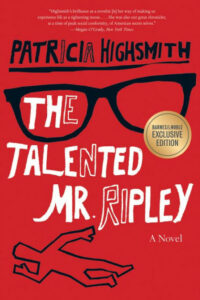
Patricia Highsmith, The Talented Mr. Ripley
(W. W. Norton & Company)
Tom Ripley is no cold-blooded TV sociopath, in control of his impulses and flawless in the execution of his crimes. He’s highly emotional—scarred by his aunt Dottie calling him a sissy at the age of twelve, consumed by longing for the privileged, though rather vacant Dickie Greenleaf, and full of wounded pride at having to struggle in the world while the wealthy live lives of leisure. The good life has been unjustly placed outside his reach, but for Ripley, achieving it is worth any price. Highsmith’s descriptions of Ripley’s luxe Mediterranean lifestyle make his murderous logic utterly compelling, especially when contrasted with her depictions of the dreary and grasping world of mid-century Manhattan that he so desperately wants to escape.
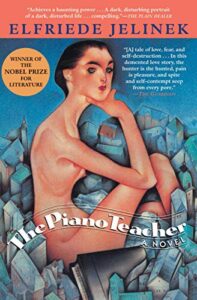
Elfriede Jelinek (trans. Joachim Neugroschel), The Piano Teacher
(Grove Press)
Made into an equally harrowing movie by Michael Haneke, Jelinek’s The Piano Teacher reaches its climax with a letter written by the sexually repressed pianist Erika Kohut to her student Walter Klemmer, the strapping young whitewater canoer who has been aggressively pursuing her. The fantasy expressed in the letter is one of extreme and violent sexual humiliation, but the fantasy beneath the fantasy is that none of the acts she describes be actually carried out—that her student love her and treat her tenderly even as she attempts to make herself as abject and repulsive as possible. The narrator’s perspective shifts constantly between Erika, Erika’s overbearing mother, and Klemmer, whose wholesome and youthful virility takes on an increasingly sinister aspect. In contrast to the chillier but also excellent movie version, Jelinek’s narrative voice is very funny, and she often uses whimsical metaphors (e.g. comparing Erika hiding in a grimy school bathroom stall to “a giraffe munching on branches”) that only reinforce the book’s brutality.
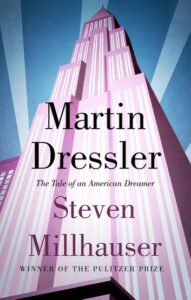
Steven Millhauser, Martin Dressler
(Vintage)
Subtitled The Tale of an American Dreamer, Martin Dressler traces the rise of Martin, a shop-keeper’s son, to become a hotel magnate whose entrepreneurial visions take on increasingly fantastical proportions. Evoking the world expositions of the 19th century, Dressler’s hotels are spaces not just for living but for experiences—imperialist displays of the wonders of the modern world, hoarded in one place so guests can enjoy them year round with no need to ever leave. The metastatic growth of Martin’s hotels perhaps alludes to the monstrous power of capitalism, but it also foreshadows the rise of the internet—which, like Martin’s Grand Cosmo, colonizes more and more of reality to create a space of limitless consumption.
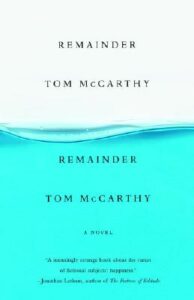
Tom McCarthy, Remainder
(Vintage)
McCarthy’s debut novel has been one of my biggest inspirations as a writer and probably has had a greater impact than any other book on A Touch of Jen. When the unnamed narrator is injured in a mysterious accident and receives an eight and a half million pound settlement, he puts his money towards a series of increasingly strange reenactments, attempting through these reenactments to experience reality in its immanence rather than at a distance. Regular life feels to him like a simulacrum, his actions like copies of actions that have taken place before, but by purposefully staging these reenactments, he paradoxically finds himself approaching something like pure experience—in the process, pulling in the world around him in increasingly dramatic and unsettling ways.
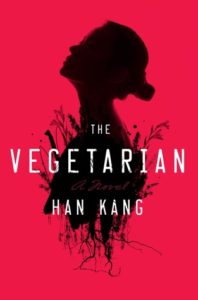
Han Kang, The Vegetarian
(Hogarth Press)
Haunted by a series of gruesome visions, Yeong-hye slowly withdraws from her human (and even animal) self—giving up meat and slowly taking on the qualities of a plant. This transformation provokes anger and indignation in her husband and parents, while eliciting the obsessive fascination of her video-artist brother-in-law. Yeong-hye remains an enigma throughout and our only access to her is through the three narrators: her boorish and conventional husband, her brother-in-law, and her sister, who becomes her caretaker as she sinks deeper into her insanity. Yet The Vegetarian doesn’t simply represent Yeong-hye as the victim of an irrational fantasy, but as someone committed to a radically different manner of living, one that comes into intense conflict both with her society and with the limits of her physical self.
__________________________________

A Touch of Jen by Beth Morgan is available now via Little Brown and Company.
Beth Morgan
Beth Morgan grew up outside Sherman, Texas and studied writing as an undergraduate at Sarah Lawrence College. She is currently completing an MFA at Brooklyn College. Her work has been published in The Iowa Review and The Kenyon Review Online.



















